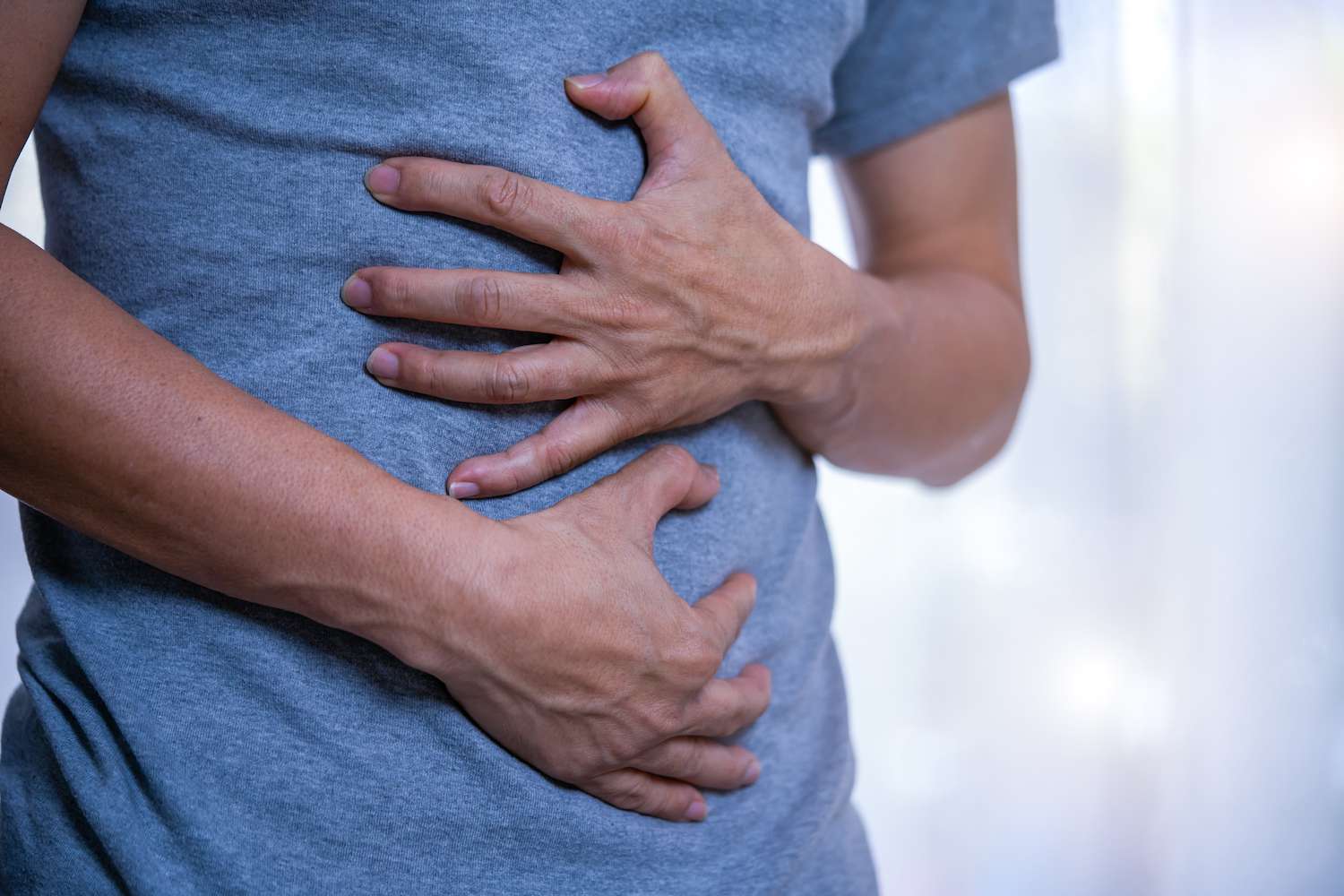

FAQs
Why Do I Fart In The Morning
Modified: August 5, 2023
Discover the reasons behind morning flatulence and find answers to other general questions about farting.
(Many of the links in this article redirect to a specific reviewed product. Your purchase of these products through affiliate links helps to generate commission for Under-tec.com, at no extra cost. Learn more)
Table of Contents
- Introduction
- Why Do People Fart?
- Farting and the Digestive System
- Understanding Morning Flatulence
- Factors Contributing to Morning Farting
- Diet and Morning Flatulence
- Impact of Sleeping Positions on Farting
- The Role of Physical Activity in Morning Farting
- Bowel Movements and Morning Flatulence
- Tips to Reduce Morning Farting
- Conclusion
Introduction
Welcome to the mysterious world of morning flatulence! If you’ve ever wondered why you tend to release more gas in the morning, you’re not alone. Many people experience this phenomenon, and it can be a source of embarrassment and discomfort.
Farting, also known as flatulence, is a natural bodily function that everyone experiences to some degree. It occurs when excess gas accumulates in the digestive system and is released through the rectum.
While passing gas is a normal part of digestion, the amount and timing of farting can vary from person to person. Some individuals may find that they experience more intense gas release in the morning, while others may notice it throughout the day.
In this article, we will delve into the fascinating world of morning flatulence, exploring the factors that contribute to this phenomenon and suggesting ways to alleviate the discomfort. So let’s dive in and uncover the secrets behind those early morning toots!
Why Do People Fart?
Farting is a natural and necessary bodily function. It happens when gas, including nitrogen, oxygen, carbon dioxide, methane, and hydrogen, builds up in the digestive system. This gas can come from various sources, including swallowed air, the breakdown of undigested food by bacteria in the large intestine, and the production of gas by certain foods during digestion.
One of the main causes of flatulence is the breakdown of carbohydrates that the body cannot fully digest. When these undigested carbohydrates reach the large intestine, bacteria in the gut ferment them, producing gas in the process.
Additionally, certain lifestyle factors or medical conditions can contribute to increased farting. For example, if you consume carbonated beverages, it can introduce extra gas into your digestive system, resulting in more frequent gas release.
Intestinal disorders, such as irritable bowel syndrome (IBS) or inflammatory bowel disease (IBD), can also cause excessive gas production and frequent farting. These conditions affect digestion and can lead to difficulties in absorbing certain substances, resulting in increased gas in the digestive system.
It’s important to note that farting is a natural and healthy process, and suppressing it completely can lead to discomfort and bloating. However, excessive and frequent flatulence can be a symptom of an underlying issue and may require further medical attention.
Now that we have a better understanding of why people fart, let’s explore why morning flatulence seems to be more prominent and what factors contribute to it.
Farting and the Digestive System
The digestive system plays a central role in the formation and release of flatulence. It is a complex process that starts as soon as you take a bite of food and continues until waste products are expelled from the body.
When you eat, food travels through the esophagus into the stomach, where it is broken down by stomach acids and digestive enzymes. From there, it moves into the small intestine, where nutrients are absorbed into the bloodstream.
Any undigested food particles and substances that the body cannot absorb pass into the large intestine, also known as the colon. The colon is home to trillions of bacteria that help break down these undigested materials.
As the bacteria in the colon digest the undigested carbohydrates and fibers, they produce gases as byproducts. These gases include nitrogen, carbon dioxide, hydrogen, methane, and small amounts of sulfur compounds – which are responsible for the unpleasant odor associated with flatulence.
When enough gas accumulates in the colon, it needs to be released. The gas moves through the intestines and reaches the rectum, where it is eventually expelled as a fart.
The frequency and intensity of farting can vary from person to person and depend on several factors, including diet, gut bacteria composition, and the efficiency of your digestive system.
Now that we have a better understanding of how farting is related to the digestive system, let’s explore why farting is commonly experienced in the morning.
Understanding Morning Flatulence
Morning flatulence refers to the common experience of passing gas during the early hours of the day. It can be particularly noticeable and sometimes more frequent than farting at other times of the day.
Several factors contribute to morning flatulence, and understanding them can help shed light on why this phenomenon occurs.
Firstly, during sleep, the body undergoes certain physiological changes that can affect the digestive system. The metabolic rate slows down, and the muscles in the digestive tract relax, which can lead to slower digestion and gas buildup overnight.
Additionally, as your body enters a state of rest, your breathing pattern changes, and you may inadvertently swallow more air. This can introduce additional gas into your digestive system and contribute to morning flatulence.
Moreover, throughout the night, your body naturally goes through a process of eliminating waste. This includes the elimination of gases that were trapped in the digestive system. As a result, when you wake up in the morning, you may experience a higher concentration of gas that needs to be released.
Furthermore, the position in which you sleep can also play a role in morning flatulence. Certain positions, such as sleeping on your back or in a fetal position, can contribute to the accumulation and release of gas. This is because these positions can cause compression or relaxation of the digestive organs, affecting gas movement.
It’s important to note that occasional morning flatulence is considered normal and not necessarily a cause for concern. However, if you frequently experience excessive gas and discomfort, it may be worth exploring further to rule out any underlying digestive issues.
Now that we have a better understanding of morning flatulence, let’s explore the specific factors that can contribute to excessive gas in the morning.
Factors Contributing to Morning Farting
Several factors can contribute to the occurrence of morning farting. Let’s explore some of the most common factors:
1. Diet: The food you consume plays a significant role in the production of gas. Certain foods, such as beans, lentils, broccoli, cabbage, and onions, contain complex carbohydrates that are challenging to digest. When these foods reach the large intestine, they often ferment, producing gas as a byproduct. If you consume these types of foods in the evening, they may still be undergoing fermentation in the morning, leading to increased gas and morning farting.
2. Eating Late at Night: Having a heavy or spicy meal late in the evening can also contribute to morning farting. When you eat a large meal close to bedtime, your body continues the digestion process while you sleep. This can result in the production of gas as the undigested food interacts with the gut bacteria overnight.
3. Swallowed Air: During sleep, some individuals can unintentionally swallow air, especially if they sleep with their mouths open or have sleep-related conditions like snoring or sleep apnea. This excessive air can lead to morning flatulence.
4. Intestinal Disorders: Individuals with certain gastrointestinal conditions, such as irritable bowel syndrome (IBS) or inflammatory bowel disease (IBD), may experience increased gas production and morning farting. These conditions can disrupt normal digestion and cause excessive gas buildup in the intestines.
5. Medications and Supplements: Some medications, such as antacids or laxatives, can contribute to increased gas production. Additionally, certain dietary supplements, like those containing probiotics or fiber, can also lead to increased flatulence, especially if taken before bed.
6. Stress and Anxiety: Psychological factors, such as stress and anxiety, can influence gut functioning and contribute to gas production. If you experience high levels of stress or anxiety, it may lead to increased morning farting.
Understanding these factors can help you identify potential triggers and make necessary adjustments to minimize morning flatulence. However, if you’re concerned about excessive gas or experience persistent discomfort, it’s always advisable to consult with a healthcare professional for a more accurate diagnosis and personalized advice.
Diet and Morning Flatulence
What you eat can have a significant impact on your digestive system and the occurrence of morning flatulence. Certain foods are known to contribute to increased gas production and can lead to more frequent farting in the morning. Understanding these foods can help you make informed dietary choices and potentially reduce morning flatulence.
1. High-Fiber Foods: While fiber is essential for maintaining a healthy digestive system, some high-fiber foods can cause gas production. Cruciferous vegetables like broccoli, cauliflower, and cabbage are notorious for their gas-inducing properties. Legumes such as beans, lentils, and chickpeas contain complex carbohydrates that are difficult to digest, leading to increased gas production. Including these foods in your evening meals can contribute to morning flatulence.
2. Carbonated Drinks: Carbonated beverages, including soda, sparkling water, and fizzy drinks, introduce excess air into the digestive system. This can lead to increased gas production and result in morning flatulence. Avoiding or reducing your consumption of carbonated drinks, especially in the evenings, can help manage gas buildup overnight.
3. Dairy Products: Dairy products such as milk, cheese, and ice cream can be challenging to digest for some individuals. Lactose intolerance or difficulty digesting lactose, the sugar found in dairy products, can lead to increased gas production and morning flatulence. If you suspect dairy as a trigger, you may consider reducing or eliminating it from your diet to see if it improves your symptoms.
4. Fatty Foods: Foods high in fat can slow down digestion, leading to increased fermentation in the intestines. This can result in excess gas production and morning flatulence. Fried foods, fatty cuts of meat, and greasy snacks should be consumed in moderation, especially in the evening before bed.
5. Artificial Sweeteners: Artificial sweeteners, such as sorbitol, xylitol, and mannitol, are commonly found in sugar-free gums, candies, and some diet products. These sweeteners are not easily digestible and can cause gas and bloating. Avoiding or limiting your intake of artificial sweeteners can help reduce morning flatulence.
6. Spicy Foods: Spicy foods can stimulate the digestive system and increase gas production. Ingredients like chili peppers, hot sauces, and curry powders can contribute to morning flatulence. If you notice that spicy foods are a trigger for you, it may be best to avoid them, especially before bedtime.
Keeping a food diary and monitoring your symptoms can help you identify specific foods that may be contributing to morning flatulence. Experimenting with your diet, such as reducing your intake of gas-producing foods or spreading them out throughout the day, can help manage excessive gas and minimize morning flatulence.
Impact of Sleeping Positions on Farting
The position in which you sleep can have an impact on the occurrence and release of gases, including morning flatulence. Certain sleeping positions can affect the movement of gas through the digestive system and contribute to increased farting in the morning.
1. Sleeping on Your Back: Sleeping on your back with a flat posture can compress the abdomen and internal organs, potentially slowing down digestion. This can lead to a buildup of gas in the intestines, which may be released as morning flatulence. Additionally, sleeping on your back can make it easier for swallowed air to accumulate in the stomach, contributing to increased gas production and frequency of farting.
2. Sleeping on Your Stomach: Sleeping on your stomach can also affect digestion and gas movement. This position can put pressure on the stomach and digestive organs, potentially disrupting their normal function and leading to gas buildup. However, sleeping on your stomach may exert less pressure on the lower abdomen, which could alleviate gas pain or discomfort for some individuals.
3. Sleeping on Your Side: Sleeping on your side, particularly in the fetal position with your knees drawn toward your chest, can promote better digestion and gas movement. This position helps relax the muscles in the abdomen and can assist in the movement of gas through the intestines. Sleeping on your left side can be particularly beneficial as it allows the stomach to hang naturally, aiding in the release of gas.
4. Elevating Your Upper Body: Sleeping with your upper body elevated, using a few extra pillows or an adjustable bed, can alleviate symptoms of acid reflux and indigestion. This position can help prevent stomach acid from escaping into the esophagus and reduce the likelihood of excessive gas production during sleep.
While sleeping positions can influence gas movement in the digestive system, it’s important to note that individuals may respond differently. What works for one person may not be as effective for another. It’s essential to experiment with different sleeping positions and pay attention to your body’s response.
It’s worth mentioning that the impact of sleeping positions on morning flatulence is not an exact science and may vary depending on individual factors, such as digestive health, diet, and overall physical condition. If morning flatulence persists or causes discomfort, it’s advisable to consult with a healthcare professional for further evaluation and guidance.
The Role of Physical Activity in Morning Farting
Physical activity and exercise are known to have numerous health benefits, including improved digestion and gut health. However, engaging in physical activity, especially in the morning, can sometimes contribute to morning flatulence.
1. Increased Abdominal Pressure: During physical activity, especially exercises that involve bending, twisting, or abdominal contractions, such as crunches or yoga poses, the muscles in the abdominal area are engaged. This can increase intra-abdominal pressure, potentially forcing air and gas to move through the digestive system and leading to morning flatulence.
2. Stimulates Bowel Movements: Exercise can stimulate bowel movements and improve overall gut motility. As the muscles in the intestines contract, it helps move waste products and gases through the digestive tract. This increased movement can cause the release of trapped gas, resulting in farting, including in the morning.
3. Increased Breathing: During physical activity, your breathing rate increases, and you may tend to breathe more deeply. This can lead to swallowing excess air, especially if you are breathing through your mouth. The swallowed air can accumulate in the digestive system and contribute to increased gas production and morning farting.
4. Dietary Considerations: Physical activity, particularly cardiovascular exercises like running or cycling, can lead to dietary changes or adjustments. If you consume pre-workout snacks or energy bars that contain certain ingredients known to cause gas, such as high-fiber or protein-rich foods, it can increase the likelihood of morning flatulence the next day.
Despite the potential for increased morning flatulence, physical activity offers a range of health benefits that outweigh the temporary inconvenience of farting. Regular exercise can help improve digestion, reduce bloating, and promote overall gut health.
If morning flatulence becomes a significant concern during physical activity, there are some steps you can take to manage it. These include allowing sufficient time for digestion before exercising, choosing low-gas-producing foods as pre-workout snacks, and avoiding exercises that overly engage the abdominal muscles if they tend to cause increased flatulence for you.
It’s important to remember that everyone’s body responds differently to physical activity, and the impact on farting can vary. If you are experiencing persistent or excessive farting, particularly outside of exercise, it may be worth exploring further by consulting a healthcare professional for further evaluation and guidance.
Bowel Movements and Morning Flatulence
Bowel movements and morning flatulence are closely related, as the passage of gas is often associated with the elimination of waste from the body. Understanding the connection between bowel movements and farting can shed light on why you may experience increased flatulence in the morning.
1. Morning Bowel Movements: It’s common for many individuals to have bowel movements in the morning, shortly after waking up. This is known as the gastrocolic reflex, a natural response in which the digestive system is stimulated after a night of rest. As the intestines begin to move, it can result in the release of trapped air and gas, leading to morning flatulence.
2. Overnight Gas Buildup: As your body goes through the process of digestion overnight, gas can accumulate in the intestines. During sleep, the digestive system slows down, allowing more time for gas to build up. When you wake up, this trapped gas may need to be released, resulting in morning flatulence.
3. Food Residue: The type of food you consume can impact both the consistency of your bowel movements and the production of gas. Certain foods, such as high-fiber fruits and vegetables, can increase the bulk of your stool and promote regular bowel movements. Along with the passage of stool, any trapped gas within the intestines may also be expelled.
4. Gut Motility: The rhythmic contractions of the muscles in the digestive tract, known as gut motility, help move food and waste through the intestines. The process of gut motility can also facilitate the movement of gas through the digestive system. As the intestines contract during bowel movements, it can lead to the release of gas and morning flatulence.
It’s important to note that the frequency and intensity of morning flatulence can vary from person to person. Some individuals may experience more pronounced gas release in the morning due to their individual digestive patterns and overall gut health.
If you find that morning flatulence is accompanied by other concerning symptoms, such as changes in bowel movements or abdominal pain, it may be worth discussing these symptoms with a healthcare professional. They can provide further evaluation and guidance to identify any potential underlying issues and help you manage and alleviate excessive morning flatulence.
Tips to Reduce Morning Farting
Experiencing excessive morning flatulence can be uncomfortable and embarrassing. While farting is a natural bodily function, there are steps you can take to help reduce morning flatulence and alleviate any associated discomfort. Here are some tips to consider:
1. Be Mindful of Your Diet: Pay attention to the foods that tend to cause gas for you and try to limit or avoid them, especially in the evening. High-fiber foods, carbonated drinks, dairy products, and artificial sweeteners are common culprits. Experiment with your diet and keep a food diary to identify specific triggers and make necessary adjustments.
2. Eat Smaller, More Frequent Meals: Opt for smaller portion sizes and spread out your meals throughout the day. Eating large meals can put more stress on your digestive system and potentially lead to increased gas production. Additionally, chewing your food thoroughly can help with better digestion and minimize the amount of air swallowed while eating.
3. Stay Hydrated: Drinking an adequate amount of water throughout the day can support digestion and help prevent constipation. Proper hydration can also promote regular bowel movements, reducing the likelihood of excess gas accumulation in the morning.
4. Incorporate Probiotics: Probiotics are beneficial bacteria that can help regulate the gut flora and improve digestion. Consider incorporating probiotic-rich foods, such as yogurt, kefir, sauerkraut, or taking a probiotic supplement, to promote a healthy balance of gut bacteria.
5. Exercise Regularly: Engaging in regular physical activity can help improve digestion and promote overall gut health. Exercise stimulates bowel movements and can assist in the movement of gas through the digestive system. Aim for at least 30 minutes of moderate exercise most days of the week.
6. Practice Stress Management: Stress and anxiety can affect gut health and contribute to increased gas production. Implement stress management techniques, such as deep breathing exercises, meditation, or engaging in activities you enjoy, to help reduce stress levels and promote a healthier digestive system.
7. Seek Professional Help if Needed: If you have tried various strategies and are still experiencing persistent or excessive morning flatulence, it may be helpful to consult with a healthcare professional. They can provide a comprehensive evaluation, rule out any underlying digestive issues, and offer personalized advice and treatment options.
Remember, everyone’s digestive system is unique, and what works for one person may not work for another. It may take some time and experimentation to find the right approach for managing and reducing morning flatulence. Be patient, listen to your body, and make adjustments accordingly to find the best solution for you.
Conclusion
Morning flatulence is a common occurrence that many individuals experience. While farting is a natural bodily function and a sign of a healthy digestive system, excessive and frequent morning flatulence can be uncomfortable and embarrassing. Understanding the factors that contribute to morning flatulence and implementing strategies to manage and reduce it can lead to a more comfortable and pleasant morning routine.
Factors such as diet, sleeping positions, physical activity, and bowel movements all play a role in the occurrence of morning flatulence. Certain foods, especially high-fiber and gas-producing foods, can contribute to increased gas production and farting. Sleeping positions can affect the movement of gas through the intestines, while physical activity can stimulate bowel movements and increase gas release. Bowel movements themselves can also contribute to morning flatulence, as trapped gas is often released alongside waste products.
To reduce morning flatulence, it’s important to be mindful of your diet and identify any trigger foods that may cause excessive gas. Eating smaller, more frequent meals and staying hydrated can also support better digestion. Incorporating probiotics and regular exercise into your routine can improve overall gut health. Managing stress levels is also crucial, as stress and anxiety can affect digestion and gas production.
If you have tried various strategies and still experience persistent or excessive morning flatulence, it’s advisable to seek professional help. A healthcare professional can provide a thorough evaluation, identify any underlying digestive issues, and offer personalized advice and treatment options.
Remember that everyone’s body is unique, and what works for one person may not work for another. It may take some time and experimentation to find the right approach to manage and reduce morning flatulence. By taking proactive steps and being aware of your body’s needs, you can minimize discomfort and enjoy a more peaceful morning routine.










